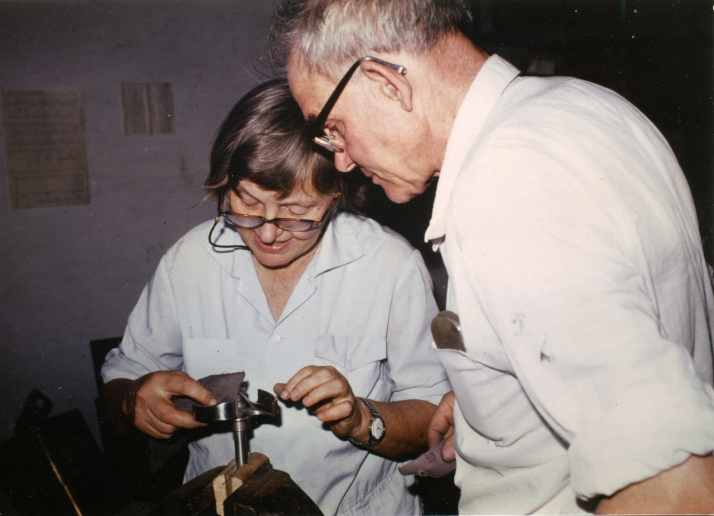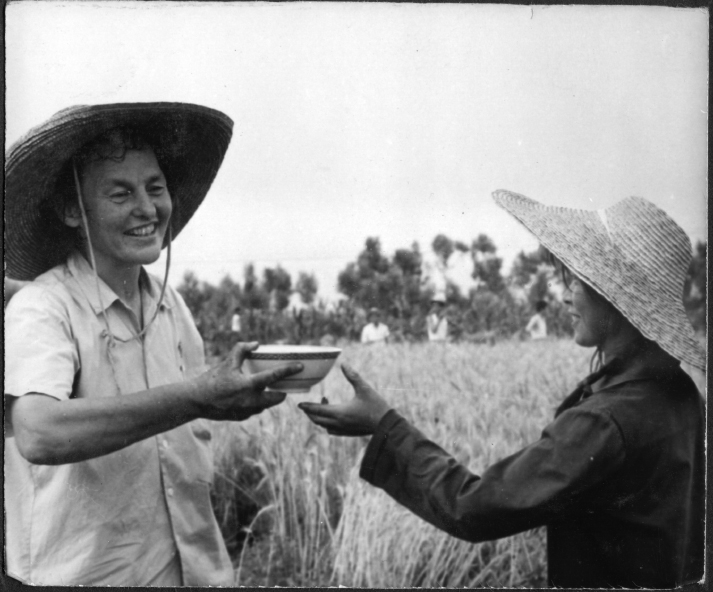| World |
| One international physicist-turned-farmer and her journey through life in China | |
|
|
 Joan Hinton and Erwin Engst discuss how to upgrade agricultural machinery at a farm in a southern suburb of Beijing back in 1981 (COURTESY PHOTO)
Joan Hinton never could have imagined that China would become the destination of her lifetime. She came, saw, experienced, anticipating more progress and development to occur nationwide, and then just ended up living here her whole life. In 1945, 23-year-old Hinton was one of the few female nuclear physicists involved in the Manhattan Project, the code name for the American project set up in 1942 to develop an atom bomb. Even as she rejoiced in the endeavor's success, she was deeply shocked when the U.S. dropped two bombs on Hiroshima and Nagasaki in Japan in 1945 to force a Japanese surrender during World War II (WWII). She then quit the project and left the U.S. "I did not want to spend my life figuring out how to kill people," she told U.S. broadcaster National Public Radio back in 2002. "I wanted to figure out how to let people have a better life, not a worse one." In 1948, she arrived in Shanghai and managed to travel to Yan'an, a former seat of the Communist Party of China (CPC) Central Committee, where she married her longtime boyfriend Erwin Engst. The couple then settled down in China and spent the next decades working as dairy farmers, designing, building and running the country's first mechanical farm. Their united energies greatly contributed to China's stockbreeding and mechanization, as well as talent training. "Hinton was a participant and a pioneer in the great cause of socialism in China, as well as a practitioner of the lofty revolutionary spirit of China," Lin Songtian, head of the Chinese People's Association for Friendship With Foreign Countries, said during an event in commemoration of the 100th birth anniversary of Hinton. "She always had a clear and definite goal of creating a better and prosperous life for all of humanity."  Joan Hinton on a farm in Beijing in 1966 (COURTESY PHOTO)
China life Hinton came from an intellectual background. Her mother Carmelita, the daughter of a Nebraska newspaper editor, was a campaigner for women's rights. In 1935, Carmelita set up Putney School, a private, co-ed boarding school committed to progressive educational methods. The school flourished and still exists today. Her brother William Hinton, a close observer of China, wrote many CPC-related books including Fanshen: A Documentary of Revolution in a Chinese Village. Her husband gathered his first impressions of China from the 1937 book Red Star Over China, written by Edgar Snow, an account of the CPC that was published when the Party was still obscure to Westerners. He came to China as a member of the UN Relief and Rehabilitation Agency in 1946 and went on to serve as an expert on farm equipment in Yan'an. "My father kept on writing letters to my mom, telling her to come to China and that China 'was about to climb a hill'. If you arrive late, he added, 'you'll miss the bus'," Fred Engst, son of Hinton and a professor at the University of International Business and Economics in Beijing, said. The couple bore witness to the establishment of the People's Republic of China in 1949. Hinton, who harbored high hopes of making milk available to the overall Chinese population, had dedicated herself to the improvement of agricultural machinery and the dairy industry at large. "They made themselves a part of the Chinese revolution," Engst explained. She applied her scientific skills to developing a continuous-flow automatic milk pasteurizer and tending a herd of about 200 cows in the following years. "Everyone was striving for the same goal and I was involved in a glorious cause," the physicist-turned-farmer once remarked about those days. "I admire the courage and moral principles of Hinton. She was truly devoted to everything she did, whether in nuclear physics or the dairy industry," Alexandra Pozhidaeva, a Russian student at Peking University who attended the event, said. Peas in a pod Hinton and her husband lived a simple life. During her time in Yan'an, she barely stood out as a foreigner, dressed in cotton or wool gender-neutral clothing and wearing a set of keys around her waist. The villagers treated the U.S. scientist like they would a family member. During one Chinese New Year's party in the village she lived in, Hinton shared her sense of humor by amusing the locals with her performances using a northern Shaanxi dialect. Her most prized possession was an old violin crafted in Italy in the 19th century, which had been her constant companion. Whenever the melodious sounds of the song Dongfang Hong (The East Is Red) resonated through the farm and across its land, colleagues would know that it was Hinton striking the strings of her beloved instrument. The couple left a lasting impression on the dairy industries of Shaanxi, Inner Mongolia Autonomous Region and Beijing. In Chengchuan Town of Ordos City in Inner Mongolia, the Yang Zao and Han Chun Memorial Hall, citing Engst and Hinton's Chinese names, officially opened in 2017. The hall delves into the couple's life story, honoring their body of work to help improve the lives of the region's people throughout the 1940s. Hinton was the first foreigner to receive China's permanent residence permit (green card) in 2004. When she passed away in Beijing in 2010 at the age of 89, some of her ashes were scattered across the grasslands of Inner Mongolia where she had worked. Lasting legacy Their son Fred's Chinese name is Yang Heping. Heping means peace in Chinese. Soong Ching Ling, the wife of modern China's founding father Dr. Sun Yat-sen, met a pregnant Hinton at the Peace Conference of the Asian and Pacific Region in Beijing in 1952 and suggested she give her newborn this name. Engst has spent half his life in China and half in the U.S., before returning to China in 2007. According to him, he had to struggle for more than three decades in the U.S., but the experience also made him realize why his parents so firmly believed in communism. "As part of the generation that suffered through WWII, my parents understood that capitalism would inevitably lead to imperialism, which would then unavoidably result in war," Engst continued. Since then U.S. President Richard Nixon's historic visit to China in 1972, Americans, especially the younger generations, had become extremely curious about everything and anything that went on in China. In 1977, at the invitation of the U.S.-China Peoples Friendship Association, Hinton made her way back to the U.S. and delivered more than 250 speeches across 53 cities, telling Americans about her experiences in the great land of mystery that was China. "She helped shape mutual understanding, friendship and mutual trust between both peoples," Lin said. "She saw the connection between everyday people and their government, and she had faith in the peaceful ideology of the CPC and wanted to contribute to this herself. Hinton by her own example demonstrated another side of the CPC and the Chinese nation overall, and became a bridge between China and the West," Zhao Yuezhi, a professor at Tsinghua University, said at the event. Nowadays, globalized neoliberalism has spawned an era of populism and isolationism. More worryingly, the threat of a new cold war against China is destabilizing a world that needs international cooperation even more because of global issues, such as COVID-19 and ecological crises. "Because of this, we are more aware of the significance and values of the internationalist spirit represented by Hinton," Zhao said. (Printed Edition Title: The Spirit Lives On) Copyedited by Elsbeth van Paridon Comments to mamm@bjreview.com |
|
||||||||||||||||||||||||||||
|